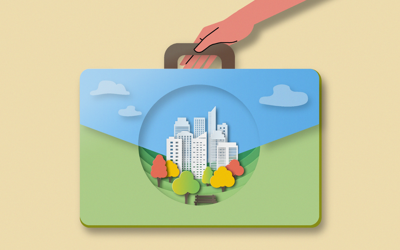“You are all climate lawyers now, whether you want to be or not… Facts, evidence, and science all make clear that we have a narrow window to avoid the worst consequences of this crisis, and there is a place for lawyers to help hold back the tide and create new pathways.” - John Kerry, US Special Presidential Envoy for Climate, to the American Bar Association in 2021.
This call to action, encouraging the legal profession to consider its role in addressing climate change, recognises that climate related issues are beginning to impact on more and more practice areas. This section of the resource hub will evolve over time as law firms and in-house teams adapt to increasing client demand for climate conscious legal advice.
Steps you can take
Solicitors should always act in a way which is compatible with their professional duties and, as acknowledged in our climate change resolution, client interests should be treated as paramount. We are not suggesting that solicitors should offer advice on matters unconnected to legal issues or outwith the scope of their competence. However, solicitors could consider taking some of the following action to support and enhance client advice:
Keep up to date
Understand climate change issues by keeping up to date with relevant laws, regulations and industry standards. This may include disclosure and reporting requirements, greenwashing regulations, minimum energy efficiency requirements, advertising and marketing standards, and local measures such as ultra-low emission zones.
The legal profession has a key role to play in influencing the law and policy related to climate change. The Society’s policy team and committees regularly analyse and respond to proposed changes in the law. The work of our Environmental Law Sub-Committee may be of particular interest.
Integrate climate considerations into your legal advice
Where competent to do so, solicitors could consider integrating climate considerations into legal advice by:
- Supporting clients with advice on legal risks associated with climate change (for example, in relation to regulatory compliance, climate litigation, reputational damage, financial impacts).
- Working with clients to identify and mitigate climate related risks specific to their industry, including liabilities related to environmental damage or climate-related litigation.
- Understanding and using climate contracting principles. For example The Chancery Lane Project (TCLP) is a global network of lawyers and business leaders using the power of climate contracting to deliver fast and fair decarbonisation. It provides free access to over 100 climate clauses, over 70 glossary terms and a suite of tools to help solicitors to decarbonise your contracts. TCLP’s Introducing Climate Clauses webinar gives an overview of TCLP, the resources available and the different ways to get involved.
- Assisting clients to comply with emerging reporting requirements.
- Advising clients on becoming Certified B Corporations (or “B Corps”). This applies to companies which meet high standards of social and environmental performance, transparency, and accountability. Some law firms are obtaining B Corp certification for their own businesses, as explored in this Legal 500 article.
Become climate literate
The language of climate change can be complex due to the use of scientific terms, varying perspectives and evolving discussions. Our glossary of terms may be a useful starting point for those who are unfamiliar with climate terminology.
Being climate literate and understanding the science of climate policies will help lawyers provide effective representation for clients, which is accurately positioned within the complex environmental landscape.
The Carbon Literacy Project supports businesses to become “Carbon Literate Organisations”, which is an accreditation recognising a substantial commitment to carbon literacy and the development of a carbon literate workforce.
Join a network
There are various networks which support legal professionals who are keen to position their advice within a climate conscious framework. Some examples include:
- The Greener Litigation Pledge and the Campaign for Greener Arbitrations – both initiatives seek to reduce the environmental impact of dispute resolution.
- Legal Sustainability Alliance - a collaborative network providing advice, information and resources to law firms and in-house counsel.
- Net Zero Lawyers Alliance – a membership body for law firms supporting acceleration of the transition to net zero. Part of their commitment includes supporting firms to offer legal services that align with and facilitate client decarbonisation goals through enhanced capacity building and training of commercial lawyers.
- General Counsel Sustainability Leaders – which aims to recognise that the opportunity for influential in-house lawyers to be a critical interface in supporting their organisation to deliver significant and rapid sustainability action.
Law firms and in-house teams which are able to adapt to the demand for climate conscious legal services will not only support clients to navigate the rapidly evolving legal landscape, but will also position those firms and teams as valuable partners in addressing climate-related issues. Firms may be able to create a competitive advantage by attracting those clients who are increasingly focused on ESG factors.
Top tips

Support for in-house solicitors
Drive positive change through your in-house role. The Sustainability Toolkit is a free resource designed by and for in-house counsel, providing a focused and practical guide on sustainability issues.

Climate conscious contracting
The Chancery Lane Project offers access to 160 free climate clauses for immediate use in agreements and contract precedents, providing contract solutions to common climate obligations.

Join a network
Organisations like the Net Zero Lawyers Alliance leverage the collective expertise of member law firms to support the provision of net zero aligned legal services.

